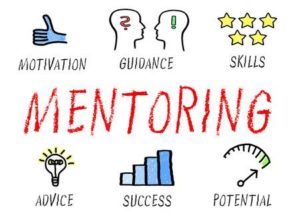Did you know that according to a survey by the American Society for Training and Development, 75% of executives say that mentoring has been critical to their career development? Mentoring isn’t only good for personal benefit, it can also help coworkers and your organization as a whole. Mentoring is different than managing or coaching. It takes into account more than sales performance management and therefore complements sales coaching.
A study done by Bellevue University on Sun Microsystems found that mentors were promoted six times more often than those not in the program, while mentees were promoted five times more often than those not in the program. In addition, retention rates were much higher for mentees (72%) and mentors (69%) than for employees who did not participate in the mentoring program (49%).
Implementing a mentorship program can help your organization reap rewards in the form of improved employee retention and job performance: 71% of Fortune 500 companies initiate mentoring programs for their employees. When employees are challenged to learn and grow, they feel that management and mentors are invested in their success.
Why Mentor?
There are many reasons why becoming a mentor is important for personal career growth. Mentorship  allows you to become a better leader, while networking with the next generation of leaders. On top of that, it’s gratifying to watch less experienced employees grow into their role. You can directly impact a mentee’s sense of his or her capabilities and strengthens that person’s loyalty to the company.
allows you to become a better leader, while networking with the next generation of leaders. On top of that, it’s gratifying to watch less experienced employees grow into their role. You can directly impact a mentee’s sense of his or her capabilities and strengthens that person’s loyalty to the company.
Kara Goldin, founder and CEO of Hint, says it best, “[mentoring] doesn’t need to be an ongoing formal arrangement. I get around 30 new mentoring requests a week and pick the ones where I feel I can genuinely offer value.”
How to Mentor
 What a mentor’s role supposed to include? Mentors pick up where managers leave off. They aren’t there to supervise and coach daily activities. Mentorship should be a mutually beneficial relationship for both parties where situations, skills, and experience can be shared.
What a mentor’s role supposed to include? Mentors pick up where managers leave off. They aren’t there to supervise and coach daily activities. Mentorship should be a mutually beneficial relationship for both parties where situations, skills, and experience can be shared.
Mentors should be willing to be open and honest about their experiences so their mentees can truly learn from them. Contrary to popular belief, a great mentor isn’t just the most successful individual in an organization. A good mentor needs to have the desire to help others and a willingness to reflect on their own experiences, including failures.
Looking to become a mentor? Here are a few tips to be the best mentor you can be.
Listen
Although you are the tenured employee, it’s important to listen to what your mentee has to say. You may know what to say and want to get straight to the point, but this is your mentee’s time to have a safe place to get their thoughts out where they won’t be judged. Listening to understand, not to reply is arguably one of the most important skills a mentor can have.
Give honest feedback
Having a fresh-faced employee looking up to you can be scary, you don’t want to hurt their feelings or set them on the wrong track. Although this is a valid concern, false platitudes or avoiding honest feedback will cause more trouble for your mentee in the long run. It’s important to establish an honest relationship fueled by open communication. As long as you’re respectful, honest feedback is a vital part of a less tenured employees’ journey towards success.
Let them make decisions
Going back to the importance of listening, you can even go a step further by letting your mentee make their own decisions. Although you may be tempted to tell them they’re doing something poorly (you’ve been there before and know better), it’s important to learn from one’s own mistakes. Help your mentee along the way with advice and experience but remember that they should learn from their own mistakes as well.
Foster mutual respect
A quote from John William Gardner, former Secretary of Health, Education, and Welfare, reads, ”If you have some respect for people as they are, you can be more effective in helping them to become better than they are.” This is the definition of what a successful mentorship should look like. If you’re participating in a mentorship program simply because it looks good on your resume or you feel like you have to, don’t. Mentorship should come from a willingness to help others develop their professional skills and progress in their careers.
Whatever it may look like, make time for mentoring as a complement to company performance management and coaching systems. It’s a small time commitment that can have a big impact on you and the next generation of leaders. For the love of sales, be a mentor!
[su_button url=”https://get.leveleleven.com/l/672783/2019-01-03/lb” target=”blank” background=”#e84e38″ size=”5″ center=”yes”]Request a Demo![/su_button]




